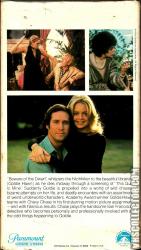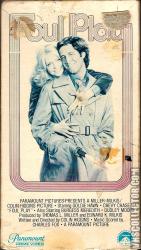Foul Play
Catalog Number
1116
-
Primary Distributor (If not listed, select "OTHER")
Catalog Number
1116
Primary Distributor (If not listed, select "OTHER")
Release Year
Country
N/A (NTSC)
N/A | N/A | N/A
N/A | N/A
Foul Play (1978)
Additional Information
Additional Information
A new comedy-thriller from Paramount for Summer '78
It's a highly dangerous comedy!!
A new comedy thriller from the creators of "Silver Streak".
As he did in his screenplay for Silver Streak (1974), writer/director Colin Higgins mixes life-and-death melodrama with broad slapstick in Foul Play. Goldie Hawn stars as Gloria Mundy, a recent divorcée whose attempts to start life anew in San Francisco are bollixed up when she is inadvertently swept up in an assassination plot against the Pope. Offering sometimes dubious aid and comfort to Gloria is bumbling federal agent Tony Carlson (Chevy Chase). The film's comedy ranges from the farcical seduction efforts by musician Stanley Tibbets (Dudley Moore) to the zany, gag-filled car-chase finale. Foul Play features character actors Rachel Roberts and Eugene Roche as villains, Burgess Meredith as a martial arts-happy landlord, and Billy Barty as a long-suffering religious bookseller. It also packs in a memorable "throwaway" gag involving a profane Scrabble game played by sweet little old ladies Queenie Smith and Hope Summers.
Foul Play is a 1978 American comic mystery/thriller film written and directed by Colin Higgins, and starring Goldie Hawn, Chevy Chase, Dudley Moore, Burgess Meredith, Eugene Roche, Rachel Roberts, Brian Dennehy and Billy Barty. In it, a recently divorced librarian is drawn into a mystery when a stranger hides a roll of film in a pack of cigarettes and gives it to her for safekeeping.
The film inspired an ABC television series starring Barry Bostwick and Deborah Raffin that aired in early 1981 and was cancelled after six episodes.
Foul Play is an homage to director Alfred Hitchcock,[3] several of whose films are referenced during the film. The premise of an innocent person becoming entangled in a web of intrigue is one common in Hitchcock films such as The 39 Steps, Saboteur, North by Northwest and, most notably, The Man Who Knew Too Much, which inspired the opera house sequence in Foul Play. When Gloria is attacked in her home, she reaches inside her knitting basket and almost chooses a pair of scissors to defend herself -- a reference to Dial M for Murder. Other Hitchcock films which receive a nod from screenwriter/director Colin Higgins include, Notorious, Vertigo, and Psycho. In addition, the plot includes a MacGuffin - an object that initially is the central focus of the film but declines in importance until it is forgotten and unexplained by the end - in the form of the roll of film concealed in the pack of cigarettes. Hitchcock popularized the term MacGuffin and used the technique in many of his films.
The name Gloria Mundy is a reference to "Sic transit gloria mundi," a Latin phrase meaning "Thus passes the glory of the world." It was included in the ritual of papal coronation ceremonies until 1963.
Higgins had written the role of Stanley Tibbets for Tim Conway, but when the actor turned it down he offered it to Dudley Moore instead. It was Moore's American film debut and led to his being cast in 10 by Blake Edwards the following year.[3]
Higgins says when he sold the script he wanted to direct it so badly he did not care who was going to play the lead roles. He met with Farrah Fawcett to play the female lead before going with Goldie Hawn. His first choice for the male lead was Harrison Ford (who had been Higgins' carpenter) who turned it down. Steve Martin was also offered the role but did not end up playing it. Higgins says he offered the part to another actor who wanted to play the cop and Stanley Tibbets. Eventually Chevy Chase was cast.[4]
The film was shot in and around San Francisco, in locations including Noe Valley, the Mission District, Hallidie Plaza, Telegraph Hill, Hayes Valley, Nob Hill, Pacific Heights, Fort Mason in the Golden Gate National Recreation Area, the Marina District, the Presidio, Potrero Hill, Japantown, and the War Memorial Opera House. The lobby scenes of the Opera House were filmed in the rotunda of the City Hall across the street. The Nuart Theater, in which Bob Scott dies early in the film, is an art house located on Santa Monica Boulevard in West Los Angeles. The houseboat, "Galatea," located at 15 Yellow Ferry Harbor in Sausalito.[5]
The film's theme song, "Ready to Take a Chance Again", was composed by Charles Fox, with lyrics by Fox's writing partner, Norman Gimbel and performed by Barry Manilow, who conceived and supervised the song's recording in partnership with Ron Dante. The soundtrack also includes "Copacabana" written by Manilow, Jack Feldman and Bruce Sussman, and performed by Manilow; "I Feel the Earth Move" by Carole King, and "Stayin' Alive," written and performed by the Bee Gees. Excerpts from Act I of Gilbert & Sullivan's The Mikado, conducted by Julius Rudel, are performed by members of the New York City Opera.
Release Date: July 18, 1978
Distrib: Paramount
Boxoffice: $44,999,621 2013: $156,921,800
It's a highly dangerous comedy!!
A new comedy thriller from the creators of "Silver Streak".
As he did in his screenplay for Silver Streak (1974), writer/director Colin Higgins mixes life-and-death melodrama with broad slapstick in Foul Play. Goldie Hawn stars as Gloria Mundy, a recent divorcée whose attempts to start life anew in San Francisco are bollixed up when she is inadvertently swept up in an assassination plot against the Pope. Offering sometimes dubious aid and comfort to Gloria is bumbling federal agent Tony Carlson (Chevy Chase). The film's comedy ranges from the farcical seduction efforts by musician Stanley Tibbets (Dudley Moore) to the zany, gag-filled car-chase finale. Foul Play features character actors Rachel Roberts and Eugene Roche as villains, Burgess Meredith as a martial arts-happy landlord, and Billy Barty as a long-suffering religious bookseller. It also packs in a memorable "throwaway" gag involving a profane Scrabble game played by sweet little old ladies Queenie Smith and Hope Summers.
Foul Play is a 1978 American comic mystery/thriller film written and directed by Colin Higgins, and starring Goldie Hawn, Chevy Chase, Dudley Moore, Burgess Meredith, Eugene Roche, Rachel Roberts, Brian Dennehy and Billy Barty. In it, a recently divorced librarian is drawn into a mystery when a stranger hides a roll of film in a pack of cigarettes and gives it to her for safekeeping.
The film inspired an ABC television series starring Barry Bostwick and Deborah Raffin that aired in early 1981 and was cancelled after six episodes.
Foul Play is an homage to director Alfred Hitchcock,[3] several of whose films are referenced during the film. The premise of an innocent person becoming entangled in a web of intrigue is one common in Hitchcock films such as The 39 Steps, Saboteur, North by Northwest and, most notably, The Man Who Knew Too Much, which inspired the opera house sequence in Foul Play. When Gloria is attacked in her home, she reaches inside her knitting basket and almost chooses a pair of scissors to defend herself -- a reference to Dial M for Murder. Other Hitchcock films which receive a nod from screenwriter/director Colin Higgins include, Notorious, Vertigo, and Psycho. In addition, the plot includes a MacGuffin - an object that initially is the central focus of the film but declines in importance until it is forgotten and unexplained by the end - in the form of the roll of film concealed in the pack of cigarettes. Hitchcock popularized the term MacGuffin and used the technique in many of his films.
The name Gloria Mundy is a reference to "Sic transit gloria mundi," a Latin phrase meaning "Thus passes the glory of the world." It was included in the ritual of papal coronation ceremonies until 1963.
Higgins had written the role of Stanley Tibbets for Tim Conway, but when the actor turned it down he offered it to Dudley Moore instead. It was Moore's American film debut and led to his being cast in 10 by Blake Edwards the following year.[3]
Higgins says when he sold the script he wanted to direct it so badly he did not care who was going to play the lead roles. He met with Farrah Fawcett to play the female lead before going with Goldie Hawn. His first choice for the male lead was Harrison Ford (who had been Higgins' carpenter) who turned it down. Steve Martin was also offered the role but did not end up playing it. Higgins says he offered the part to another actor who wanted to play the cop and Stanley Tibbets. Eventually Chevy Chase was cast.[4]
The film was shot in and around San Francisco, in locations including Noe Valley, the Mission District, Hallidie Plaza, Telegraph Hill, Hayes Valley, Nob Hill, Pacific Heights, Fort Mason in the Golden Gate National Recreation Area, the Marina District, the Presidio, Potrero Hill, Japantown, and the War Memorial Opera House. The lobby scenes of the Opera House were filmed in the rotunda of the City Hall across the street. The Nuart Theater, in which Bob Scott dies early in the film, is an art house located on Santa Monica Boulevard in West Los Angeles. The houseboat, "Galatea," located at 15 Yellow Ferry Harbor in Sausalito.[5]
The film's theme song, "Ready to Take a Chance Again", was composed by Charles Fox, with lyrics by Fox's writing partner, Norman Gimbel and performed by Barry Manilow, who conceived and supervised the song's recording in partnership with Ron Dante. The soundtrack also includes "Copacabana" written by Manilow, Jack Feldman and Bruce Sussman, and performed by Manilow; "I Feel the Earth Move" by Carole King, and "Stayin' Alive," written and performed by the Bee Gees. Excerpts from Act I of Gilbert & Sullivan's The Mikado, conducted by Julius Rudel, are performed by members of the New York City Opera.
Release Date: July 18, 1978
Distrib: Paramount
Boxoffice: $44,999,621 2013: $156,921,800
Related Releases1
Catalog Number
1116
Primary Distributor (If not listed, select "OTHER")
Foul Play (1978)
Release Year
Catalog Number
1116
Primary Distributor (If not listed, select "OTHER")
Catalog Number
1116










Comments0
Login / Register to post comments